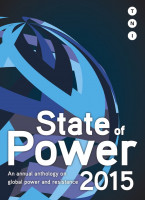The Hare and the Tortoise The Dialectics of Resistance and Uniformity in the Race to Capitalist Civilization
This article delves into the underpinnings of society of a post-colonial nation, exploring the connections to those international actors that still influence its innermost levels. It looks at the operation of power in the international system, its impulse for endurance through innovations, and the spaces for resistance produced in consequence.

Authors
The dissemination of sovereignty to formerly colonised territories is often posited as a point of interruption in the inequitable Global North/South relationship and co-constitutive discourses.
This paper aims to go below the surface of such interruption and into its internal realities. It will do so by focusing on discursive and institutional forms of power that both preserve and modify their colonial progenitor. Within this power framework, the interactions between the transnational and national will be considered, as will the blurring of boundaries that enables the constitution of the global in the local.
These dynamics will be examined through two case studies of neoliberal interventions and contestation: China’s foreign investment infrastructure and Tunisia’s “post-colonial” social and economic development, in particular in light of the 2011 uprisings. Despite differences in trajectories of state development, as well as political, social, cultural and economic formations, China and Tunisia share a recent history of uneven incorporation into the neoliberal global structure. A comparative analysis also reveals the various facets of the power and resistance dynamic that animate neoliberal governance.
Introduction
Aesop’s famous fable tells the story of a tortoise who, ridiculed by the hare for being slow, challenges it to a race. The hare soon leaves the tortoise behind and, confident of winning, takes a nap midway. Upon awakening, he finds that his competitor, crawling slowly but steadily, has arrived before him. It is thus, that at the moment of challenge and encounter, power was transferred and, an apparently predetermined outcome was inversed - strength became weakness, weakness transformed into strength, and a derided attribute, when coupled with steadfastness, produced a win.
Transporting this tale to the realm of the political, this article will explore the operation of power in the international system, its impulse for endurance through innovations, and the spaces for resistance produced in consequence. Temporally, it will focus on the post-colonial order, when organised liberation movements engendered an apparent shift in the interstate dynamic of power.
Sovereignty was disseminated to formerly colonised territories, delivering a cascade of states, the supreme jurisdiction of which was to be protected by the doctrine of non-interference. This shift is often posited as a point of interruption in the continuum of inequitable Global North/South relationship.
Our aim is to go below the surface of such interruption and into its internal realities. For the new states, the fact of their sovereignty represented a hard-won gain. It was understood to have conferred on them real power and equality, both political and economic. The desirability of western-oriented teleological notion of development was generally accepted. However, the path to development required that the relationship between former colonised and former coloniser be transformed.
By contrast, for the former coloniser the dissemination of sovereignty signified the triumph of a European construct, universalised and institutionalized so as to ensure Europe’s historical place atop a hierarchical world order. A new power constellation called for new devices. Overt power having been marginalised and at least, formally outlawed, it would be replaced by more subtle and obscure forms.
